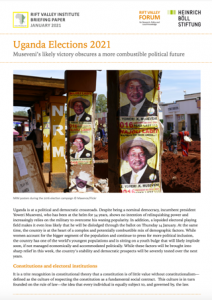Uganda is at a political and democratic crossroads. Despite being a nominal democracy, incumbent president Yoweri Museveni, who has been at the helm for 34 years, shows no intention of relinquishing power and increasingly relies on the military to overcome his waning popularity. In addition, a lopsided electoral playing field makes it even less likely that he will be dislodged through the ballot on Thursday 14 January. At the same time, the country is at the heart of a complex and potentially combustible mix of demographic factors. While women account for the bigger segment of the population and continue to press for more political inclusion, the country has one of the world’s youngest populations and is sitting on a youth bulge that will likely implode soon, if not managed economically and accommodated politically. While these factors will be brought into sharp relief in this week, the country’s stability and democratic prospects will be severely tested over the next years.

2025 Year in Review
The 2025 Year in Review provides an overview of the Rift Valley Institute’s work over the past year across eastern and central Africa. The report



